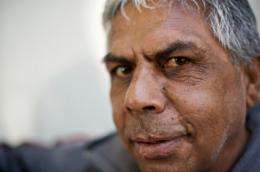Aboriginal Australians at risk of bone, muscle pain

(PhysOrg.com) -- Aboriginal Australians are at risk of increased bone and muscle pain due to their inability to produce sufficient vitamin D, according to a University of Adelaide study published in the Medical Journal of Australia today.
Health researcher Dr Simon Vanlint says a study of 58 Aboriginal adults in South Australia showed significantly lower vitamin D serum levels compared to paler-skinned individuals, leading to a greater chance of them developing bone, muscle and other conditions.
Dr Vanlint, from the Discipline of General Practice at the University of Adelaide, says because the brown skin pigment melanin filters ultraviolet B light, darker-skinned individuals synthesise less vitamin D, resulting in a range of health problems.
"Vitamin D insufficiency is highly prevalent in this population of adult Aboriginal Australians, with low levels found in all seasons other than summer," he says.
"This has also been shown in African-Americans, Pacific Islander and Maori people and Indigenous Canadians."
Dr Vanlint says the seasonal variation in vitamin D levels among the study group suggests that ultraviolet light - the best natural source of vitamin D - plays the major role in maintaining vitamin D levels.
"It is likely that time spent outdoors, particularly if it includes weight-bearing exercise, will have health benefits in addition to those associated with increased vitamin D production."
The study group comprised 40 women and 18 men from community-controlled health centres in Adelaide and Yalata in South Australia.
Vitamin D plays an important role in helping the body to absorb calcium and maintain healthy bones, muscles and teeth. Vitamin D deficiency can increase a person's risk of bone and muscle pain, rickets (in children) and osteoporosis.
Recent studies have also suggested links between a lack of vitamin D and a wide range of conditions, including diabetes, heart disease, cancer, lung disease, mental health problems, skin disorders and some auto-immune diseases.
"If appropriate sunlight exposure is not sufficient or not possible, vitamin D is very safe to give as a supplement, and is not expensive," Dr Vanlint says.
"Given that vitamin D is very simple to provide as a supplement, it is possible that there could be significant health benefits for this section of our population."
More information: www.mja.com.au/















